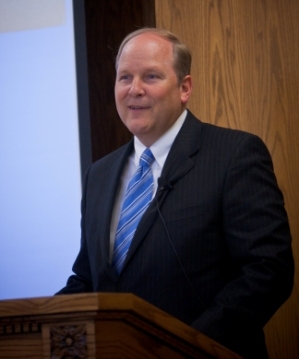





Professor Gary B. Doxey presented on 23 June 2011 the third lecture in the bi-monthly Religious Freedom Discussion Series, sponsored by the International Center for Law and Religion Studies in connection with the Community Service Outreach Committee of the J. Reuben Clark Law Society. Professor Doxey's address, "Historical Perspectives on the Rise of Religious Freedom," was delivered at the J. Reuben Clark Law School on the campus of Brigham Young University and broadcast as a live Webinar.
- Technical difficulties during the presentation prevented a recording of the orginal lecture
- A PowerPoint presentation is available here.
In his address, Professor Doxey gave an overview of the main features of the conventional narrative of the rise of religious freedom, beginning with Christian reformers, the religious wars of the 17th century, the European Enlightenment, and the catalyzing influences present in America during the revolutionary period and the formative years of U.S. constitutional history. Doxey reminded his listeners that the adoption of the First Amendment, though a culminating development, was not the end of the story. He noted the impact of the French Revolution and explained how religious freedom has become recognized—unfortunately, not always in practice—as a fundamental human right around the world since World War II.
Doxey argued that the conventional historical narrative of the rise of religious liberty is far from complete. The meaning and application of the First Amendment, for instance, is in constant flux. One only has to think of the Holocaust and ethnic cleansing in Kosovo to remember that some of the most horrific breaches of religious freedom have occurred in modern developed societies, long after these societies had supposedly adopted enlightened ways. Instances of religiously motivated violence and runaway majority oppression of minority religions in the present day plainly show that the story of religious freedom is not a story of the past only.
The challenges to creating a more complete history of religious freedom are many. That no seminal work on the subject exists is clear proof that it is a neglected field. Most of the relevant studies are from the ancillary fields of religious history, intellectual history, and legal history. Volumes have been written on early modern religious conflicts in Europe, Enlightenment philosophies of religious toleration, and the history of particular legal and constitutional developments. However, as respects the history of religious liberty specifically, the scope of inquiry has often focused narrowly on the genealogy of thoughts exchanged among European elites and on the historical origins and meanings of words in legal documents. The ultimate impact of laws and high-minded ideas on the throngs of common people who were ignorant of them has largely been ignored.
Fruitful recent social histories on religious toleration and persecution have begun to remedy a few of these defects, but in a somewhat tangential way that often reveals a seemingly tit-for-tat ignorance of solid intellectual, legal, and constitutional history. Moreover, virtually no study of note connects the conventional early modern/Enlightenment narrative of the rise of religious freedom to its ancient and medieval antecedents, much less to the broader panorama of non-western history. Doxey called for renewed efforts to reexamine and go beyond the conventional narrative and create a more complete, contextualized and nuanced history.
